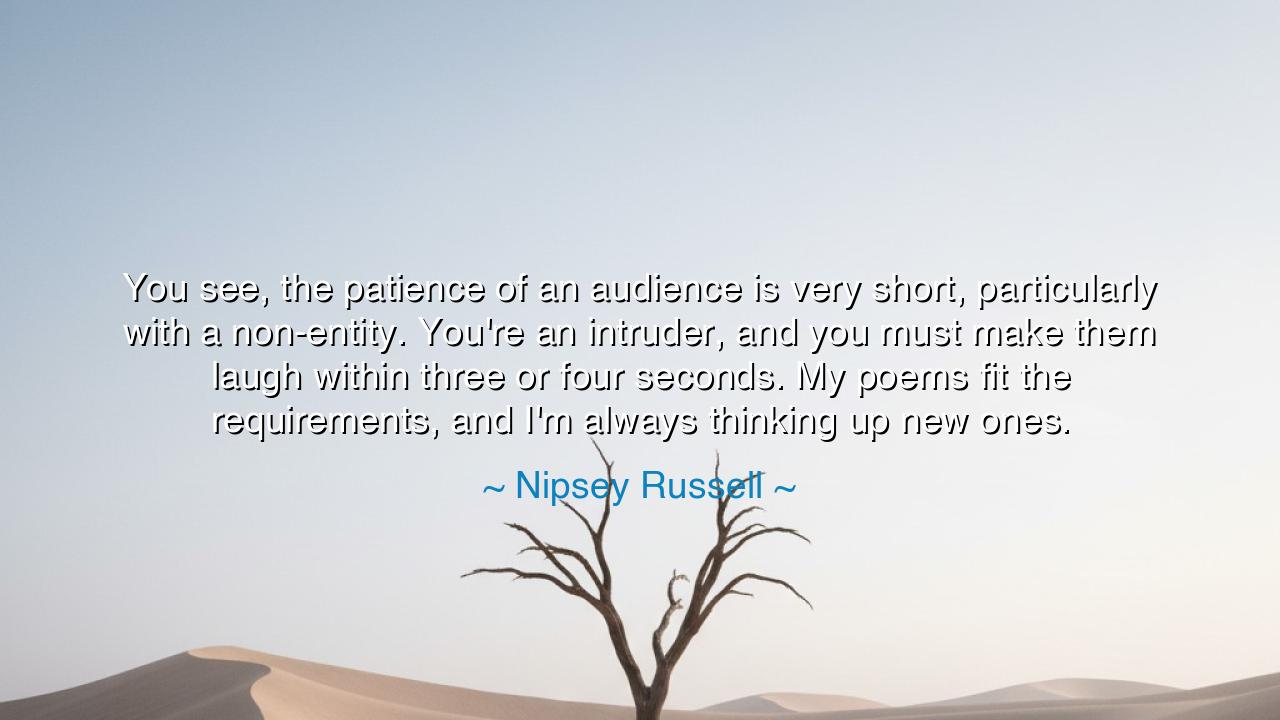
You see, the patience of an audience is very short, particularly
You see, the patience of an audience is very short, particularly with a non-entity. You're an intruder, and you must make them laugh within three or four seconds. My poems fit the requirements, and I'm always thinking up new ones.






Hear the voice of Nipsey Russell, the poet-comedian of his age, who spoke with candor and truth: “You see, the patience of an audience is very short, particularly with a non-entity. You’re an intruder, and you must make them laugh within three or four seconds. My poems fit the requirements, and I’m always thinking up new ones.” Though these words are cast in the realm of performance, they bear the weight of timeless wisdom. For they teach us of the nature of human hearts, of the fleeting window in which a soul may prove its worth, and of the relentless demand for renewal in the eyes of those who watch.
The ancients knew this law well. The orators of Greece, when they rose to speak in the Agora, had but moments to seize the attention of the crowd. A single stumble, a breath too long, and the throng would turn away, seeking another voice. To stand before an audience is to hold fire in one’s hands—it must blaze at once, or it dies. Thus Russell’s words are not only about the craft of comedy, but about the urgency of first impressions and the power of presence.
Consider the plight of a young Demosthenes, who sought to become Athens’ greatest speaker. He was mocked, dismissed as a non-entity, his voice weak, his manner awkward. To the crowd, he was but an intruder. Yet he did not despair. He placed pebbles in his mouth to strengthen his speech, shouted his words against the roar of the sea, and honed his craft until, at last, he could command the attention of any gathering. Like Russell with his poems, Demosthenes discovered that only relentless practice and swift mastery of the first moment could break through the wall of indifference.
Russell also speaks of laughter, that most ancient of medicines. To cause a man to laugh is to pierce through his armor, to disarm suspicion, to turn a stranger into a companion. But laughter comes not from delay, but from immediacy. The audience, restless and distracted, demands delight quickly, or else they turn their gaze away. In this we see a truth beyond performance: that human connection, whether in comedy, in love, or in leadership, depends on seizing the opening moments and filling them with warmth, wit, or wonder.
The deeper meaning lies also in Russell’s devotion to renewal: “I’m always thinking up new ones.” For no performance lives forever, no jest remains fresh for all time. The world is ever hungry, and yesterday’s triumph is quickly forgotten. Thus, he reminds us that success is not a single victory, but a continuous cycle of creation. Just as the farmer must plant again each season, so the artist, the leader, the teacher must forever renew their gift, lest the audience grow weary.
The lesson is this: when you stand before others, whether to speak, to lead, or to perform, remember that their patience is short and their hearts are quick to judge. Do not cower before this truth, but embrace it. Strike boldly in the first moments, let your presence blaze like a torch, and offer something of worth—be it laughter, wisdom, or inspiration. And when your work is done, do not rest in complacency, but prepare anew, for tomorrow’s audience will demand another gift.
Practical actions await you: prepare your craft with diligence, sharpen your opening words, and know how to seize attention swiftly. Cultivate originality, for freshness is the food of the human spirit. And above all, let humility guide you—see yourself as the intruder, not the master, and earn the right to be heard with every moment you stand before others.
Thus let Nipsey Russell’s words echo through time: the audience is fleeting, the patience of men is short, but the one who comes prepared, who strikes swiftly, and who forever renews his art will win hearts again and again. For life itself is a stage, and all of us are called to prove ourselves in the brief moments given—let us meet those moments with courage, creativity, and joy.






AAdministratorAdministrator
Welcome, honored guests. Please leave a comment, we will respond soon